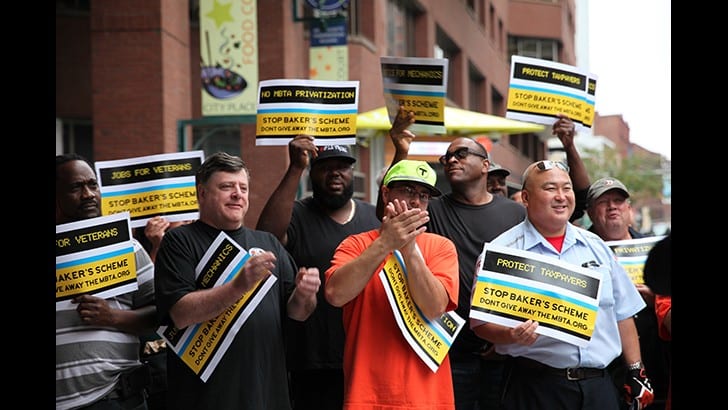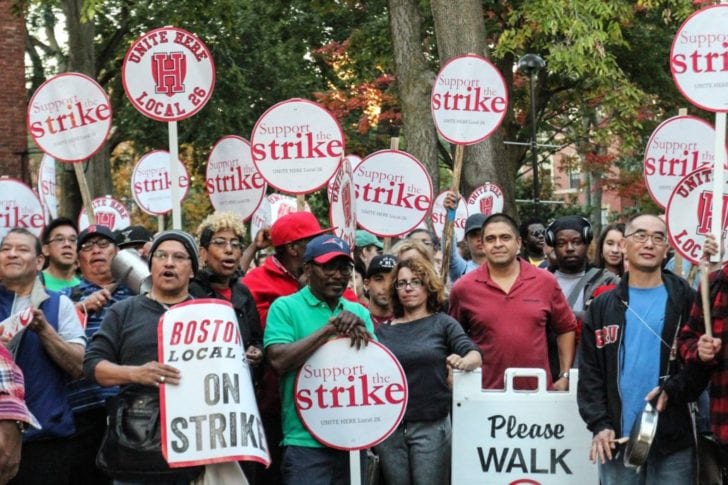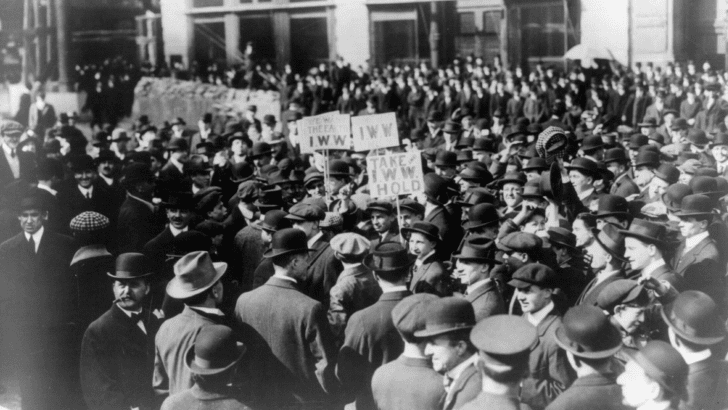
MBTA bus mechanics beat back privatization… at a cost
February 14, 2018
BY JASON PRAMAS @JASONPRAMAS
Unionized bus mechanics represented by the International Association of Machinists Local 264 won an important victory last week when they agreed to a four-year contract with the MBTA—effectively ending a two-year effort by the transportation authority’s Fiscal and Management Control Board to privatize three bus garages, eliminate 150 good jobs according to IAM District 15 Assistant Directing Business Representative Mike Vartabedian, and crush the union.
The attack on the bus mechanics, and all unionized MBTA workers, actually began in 2015 when Gov. Charlie Baker (with plenty of help from his pals at his old stomping grounds, the right-wing libertarian Pioneer Institute) pushed a three-year suspension of the landmark anti-privatization Pacheco Law through the Mass legislature as part of the annual budget. The suspension applied only to the T. Shortly thereafter, Baker appointed the five-member FMCB—one of them, Steve Poftak, being a former Pioneer staffer like the governor—to get to work privatizing a public transit system serving much of eastern Massachusetts.
Because, you know, reasons. Most of them involving transferring as much public wealth into private hands as possible. And freedom. For the rich to get richer and the poor to starve.
The 1993 law, officially known as the Taxpayer Protection Act, protects unionized state workers and the people of Massachusetts from outsourcing and related corporate malfeasance in six ways that the Institute for Local Self-Reliance was thoughtful enough to summarize:
- Agencies seeking to contract out a service must prove not only that the move would save money, but that it would save money even if state employees were to work in the “most cost-efficient manner.”
- Firms cannot win business if they’ll pay less than the lowest amount the state pays its employees for similar services.
- Every privatization contract must contain provisions requiring the contractor to offer positions to qualified regular employees of the agency whose state employment is terminated because of the privatization contract.
- The contractor must add lost tax revenues to the cost of the bid if any work is to be performed outside Massachusetts.
- Private bids must also include estimated costs of monitoring contractor performance.
- Public employees have the opportunity to submit bids to keep the work in-house and “the agency shall provide adequate resources for the purpose of encouraging and assisting present agency employees to organize and submit a bid to provide the subject services.”
In suspending the law, the Baker administration meant to allow corporations free reign to eliminate huge numbers of good unionized public transit jobs and replace them with bad underpaid jobs with few or no benefits and little security. All in the service of reigning in costs at a quasi-independent transportation agency that is only having budget trouble because the state government—including the dominant Democratic legislative leadership that absolutely does not put its money where its collective mouth is—refuses to return to fully funding it based on its actual needs (see my 2016 column “Squawk or Walk” for more background). Rather than hobbling the MBTA with insufficient annual support and then dumping a huge amount of Big Dig debt on it for good measure. Because that might involve finally raising taxes on corporations and the rich. And corporations and the rich don’t want that. Just ask Raise Up Massachusetts—the folks pushing for the upcoming referendum fight for the “Millionaires’ Tax” that would devote money to properly funding public transit, among other worthy goals.
The expected script happily got flipped by the Machinists union and the labor-led INVEST NOW coalition, who fought hard for many months to demonstrate that privatizing the MBTA bus garages was a bad move. For everyone but the fat cats that stood to make millions off the misery of T workers and T riders alike. Since the already-overburdened, underfunded T bus system would basically collapse without the skilled union mechanics keeping its bus fleet in good order for short money.
The union coalition and allies like Attorney General Maura Healey scored major points when they demonstrated that only one private transportation company, First Transit, had submitted a bid to run the T bus garages in question. The same company that paid a $7.3 million settlement to the Commonwealth in 2012 after backing out of a contract to run the T’s The Ride, a door-to-door service for disabled commuters.
Advocates and labor-friendly legislators—including the author of the Pacheco Law, Sen. Marc Pacheco (D-Taunton), himself—testified to the Fiscal and Management Control Board that First Transit’s action resulted in a $66 million deficit for the state, according to State House News Service.
Ultimately, the union’s grassroots campaign worked, and the FMCB, the governor, conservatives from both parties in the legislature, and the ideologues at the Pioneer Institute were forced to back off this latest privatization push. But all battles exact a cost. So while the T bus mechanics scored a solid win overall, their new contract looks to be a mixed bag. On the upside, it keeps all nine MBTA bus garages plus one support facility in Everett public and includes Taxpayer Protection Act provisions that will help provide Local 264 members legal cover against privatization until the law’s suspension ends later this year.
On the downside, it forces the workers to accept low cost-of-living raises over the contract term and allows the T to bring in new workers for worse money and benefits than they would have started with previously, according to the Patriot Ledger. And, like the Carmen’s Union contract that preceded it, the Machinists’ agreement allows the T to hire private contractors to perform work outside its 955-bus core service. But only if they “maintain the same procedures and quality standards followed by the machinists,” according to Commonwealth magazine.
Since the devil is often in the details of such statements, it’s hard to tell if that will really stop T management from undercutting the union should bus service expand. Which it very well might—since the Boston Globe reported that T capital expenditures have risen under the Baker administration, even while it has done its level best to ram through cuts in operating expenditures on the backs of workers. Like the 406 bus mechanics and fuelers in Local 264’s MBTA bargaining unit, who are essentially having $4.1 million a year in concessions forced on them in the service of a completely avoidable budget deficit.
Still, all in all, the contract demonstrates that fighting for justice in the workplace remains far better than not fighting. If the union had been defeated, many workers would have lost their jobs and their families would have been immediately thrown into poverty. Their replacements would have been un-unionized and unable to easily defend themselves against T management. So, readers observing this fight should think twice before criticizing the bus mechanics, and think carefully about their own work situation. If your bosses decide to outsource your jobs to some fly-by-night company tomorrow, could you and your co-workers defend yourselves? For nearly 90 percent of American workers who aren’t unionized, the answer remains “probably not.”
The only thing that can change that sorry situation is for workers to stand their ground. Those of you interested in doing that should check out the website of the main US labor federation, the AFL-CIO, for more information on how to form a union at your workplace: aflcio.org/formaunion.
It’s not easy to do, no lie. I lost a job for helping lead a union drive not three years back. Fortunately, all the other workers in my former unit at that employer are now unionized. So it’s worth the risk. And it’s necessary. And everyone who lives from paycheck to paycheck should consider it.
Apparent Horizon is syndicated by the Boston Institute for Nonprofit Journalism. Jason Pramas is BINJ’s network director, and executive editor and associate publisher of DigBoston. Copyright 2018 Jason Pramas. Licensed for use by the Boston Institute for Nonprofit Journalism and media outlets in its network.










